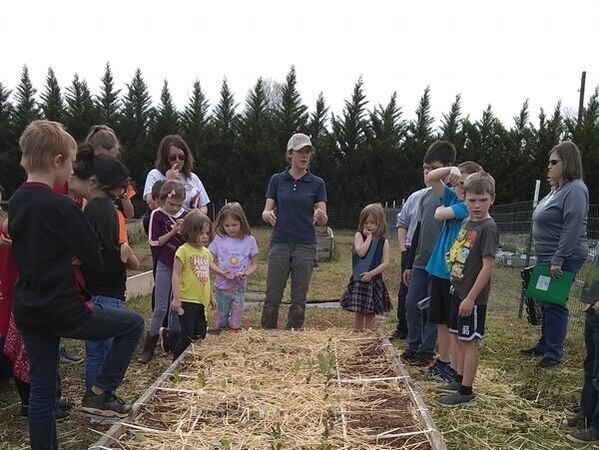 As part of this year’s Female Farmer Profile Project, we are expanding this idea to include the many women who work to build an equitable, sustainable High Country local food system. This week, we’d like to give a warm welcome to Elina Snyder as we highlight cooperative extension agents as key players in our local food system. As a Caldwell County extension agent, Elina says the most satisfying part of her job is getting to continually learn as she relays information coming out of NC State’s agriculture research facilities to local farmers. She knew she wanted to pursue this role when she was working on a farm and watched the farm manager, who had advanced degrees in agriculture, make firm decisions rooted in science. With an appreciation for this and an intention to one day run her own farm, Elina decided to pursue an education that would both empower her to succeed in farming and enable her to pursue a career in Cooperative Extension. She graduated from Penn State University with a M.S in Agronomy. Her thesis work investigated ways to reduce herbicide use and manage weeds in crop production. Extension agents are vital to the local food system for the significant role they play in creating connections. Elina connects growers to buyers, farms to resources, and people to information. Working on a farm clued her into the rhythms of farmers, gave her a thorough understanding of the demands of farming, and helped her understand the priorities of farmers which isn’t always adopting new research techniques. Extension agent positions have historically been male dominated but there has since seen a big shift. A lot of extension work is building relationships, which can sometimes be challenging for women in this position. Sometimes clients are surprised and uneasy working with a woman, which can create challenges around trust building. Sometimes clients even ask for a second opinion from a male, but Elina says that she just keeps doing her job the best she can which sometimes may be connecting clients with other males if she feels this will best benefit them. “I can’t change people but I can continue to show them what I can offer in this role” Patience, understanding, and a warm sincerity is what makes Elina so good at her job. Thank you Elina for helping farmers bring us all the products we love!
0 Comments
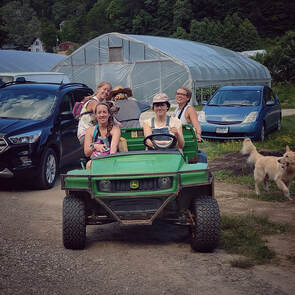 The family on Tumbling Shoals Farm isn’t what you may think of as a traditional family, yet sitting in farmher Shiloh Avery’s living room with most members of what Shiloh likes to refer to as the Farm-ily, the connection and dynamic is undeniable. When navigating the intersection between land and people in sustainable agriculture, Shiloh stands firm in her belief that is starts with the people working on her farm. “Taking care of our farmily is our first importance before we can even feed the community, (we are) trying to take care of the farmily and make sure everyone is happy and healthy… we can't do what we do, and we can't feed all the people without these people here” Taking care of the Farmily means paying their workers fair wages. The economics of farming are a thin margin and sometimes consumers think farmers are price gouging, but at Tumbling Shoals, Shiloh guarantees that this is never the case. “It is a lot of super hard work and we do our very best to be as efficient as possible and to get the product to them as cheaply as we possibly we can. For some things that's just not cheap, some things cost a lot to grow or to pick.” This weekend, when browsing at your local Farmer’s Market, keep in mind that the slight increase in price (when compared to products of a grocery store) is to ensure that farms are able to be sustainable and fair to the members of the farm working daily to bring you the products you want. While farming is a lot of hard work, Shiloh reminds people that “you're coaxing life out of the soil with your hands, it's like, what is better than that!!” Check out Tumbling Shoals at the Hickory and Watauga Farmer’s Markets and don’t forget to thank a local farmer for fostering life, health, and community. Interview conducted by Ahna Robbins, Women in Agriculture Profile Project Intern On February 2nd, 2018, Takahiro Omori and Dave Walker of Blue Ridge Women in Agriculture interviewed Melinda Brown from Never Ending Farm in Vilas, NC.
Takahiro: Why do you come to work everyday? Melinda: Well, haha, I come to work every day because the animals really rely on me to feed and water them. And, I do enjoy working with the animals. I like staying at home and interacting with them. 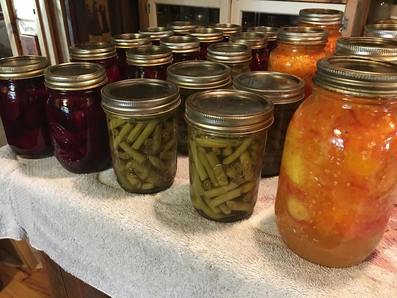 Takahiro: What do you grow? Melinda: I grow all my own vegetables. I process and can everything, so I pretty much raise almost all my own food. And then I farrow pigs, raise a lot of pork, and feeder pigs for some of the local people. I have a couple of cattle, that I basically just raise for my own personally use. The vegetables that I grow are basically beets, beans, and potatoes. I pickle some of the vegetables like beets and green beans, and I can all my potatoes, including sweet potatoes. My root cellar doesn’t accommodate root crops, and I’m not a big fan of soft potatoes. They’re all just growing sprouts on them through the winter, so I just can everything. A lot of people haven’t heard of canning potatoes. Probably about 30 years ago, I dug my potatoes too early. Some old man told me, “Those won’t keep ya know?” So, I found a recipe to can them. Now, I just always can them. It takes time to do that, but you can make a lot of food from them. When people come over for dinner, you can just whip out a can and have some mash potatoes in no time. You can come over to my house anytime and we’ll be eating first class with 10 jars of them. It's almost like fast food, but it's good food. [Laughter] Takahiro: How long have you been growing? Melinda: I’ve been up here around Boone since ‘93. I had a couple of acres when I was down in Florida. It’s been a few years. I lived in Florida and always kept a couple cows. The very first pig I’ve ever had— it’s a bit of a story. I had a landscape business down there, I used to always buy fuel from this guy from this Union 76 gas station. And one morning, he called, and he said, “You gotta’ come down here. Somebody put a pig in my gas station.” And I just moved east of town, and I had a couple acres you know. I never had any pigs, but I always had a couple of cows out there and I had some turkeys and chickens and some pheasants. 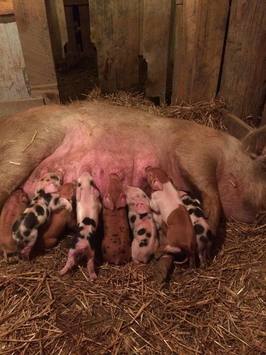 So, I rush in there, and sure enough somebody had taken this wild hog—'cause in Florida they have a lot of wild hogs they’re just out in the woods, they’re just black wild hogs. They’ll get big, but they just have razor black hair on them and they just did it for a joke—they just stuck this pig in this guy’s gas station. So, we caught it, and it wasn’t really big. It was maybe just 150 pounds or so. We got this hog, and we took it out to my house. It was a girl pig. We rigged up this place in my barn out of pallets and made this little fenced in area. And we were going to butcher it. It was just that I was just a little busy with my business, and we just didn’t do it, and then didn’t do it, and then didn’t do it. About a month and half to two months later, I go out one morning, well she had had babies. But, she was a wild hog. Around Christmas time, I took one of the babies and gave it back to the guy. And they kept the pig in the house for about three months and it was just a pet pig. I can't remember what its name was, but one day—they become great house pets because they can learn to use the litter box—she became mischievous. They’ll just dig at your house plants. They’re like a mischievous puppy that hasn’t been trained. I mean pigs are great house pets. They brought her out there to my farm with a little white pillow. I remember she was white. The wild hog was black but for some reason she must have been crossed up or something. She brought the little pig out there and introduced her back to the other pigs. I raised it up and butchered her. I took them the box of meat and everything. It was pretty funny. That was my first pig, my wild hog. From there, I just got into raising better quality pigs. When I was in Florida I pretty much raised white pigs cause it’s hot down there. You really wanna’ stay more towards white pigs. Takahiro: How many acres do you grow on? Melinda: I have about 10 acres. I moved up here in 1993 and I left for few years. The property that I live on, was kind of unmaintained for a few years and over growing. Now that I’ve come back, I have gotten rid my goats, because they just don’t commingle with pigs really well. And I really like to focus on my pigs. We used to have 50 acres, a partner and I, then we split up, and I ended up with 10 acres. About 6 years ago when I came back, I was just living in my motor home, traveling around. I came back and started building a structure to live in. It’s kind of a barn that I converted to a house. Takahiro: Are there challenges, experiences and opportunities as a (female) farmer? Melinda: I was really grateful to get this grant from Blue Ridge Women in Agriculture, but I had written another grant for another group. I was kinda disappointed because I’d spent a lot of time doing that, and I’m not a good grant writer, my goodness when they read mine I’m sure it’s like no other because it’s very simple. They had over 40 grants that they gave out of like 90 something. And, I didn’t even fall into that category, you know? I felt bad because I do contribute to the community. If it’s really truly about time to build our core and our community... And I know I’m a woman, I’m freaking 60 and I got what I got which is scratching by, a little pig farmer. It just felt bad that I didn’t get into that almost 50 percent. It was discouraging to me because I had been to the workshops and I had learned so much about the pastures and it was...you know, when some people write grants they’ll write this grant and that grant the same. You know? So, we’ll just take this or that one. Well, I spent a bunch of time writing two grants. And this project over there with them with all the stuff that I had learned at meat conferences, all about improving my pastures. It’s a totally different project. So, it was little discouraging. And then, that makes me think, “What am I doing?” You know? Maybe I’m not that big of an asset in the community. I am to the point that it helps you, I know. You know, I look at myself and I'm a little woman farmer. But, what I do with the pigs helps Dave (Walker of Daffodil Spring Farm) and for Andy and Holly (at Against the Grain Farm). They farm, and it’s huge part of their income to pay the mortgage. It is important to Dave to make money on his pigs and it’s not so much a hobby. 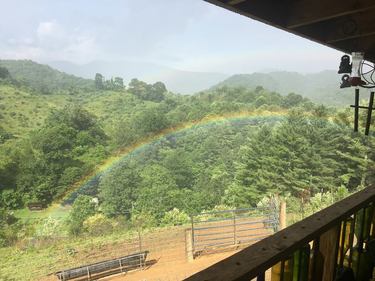 Dave: It helps them sell the other crops. Melinda: Yeah it does. There is whole big chain… Dave: What you do is important. Melinda: But as far as the mentor thing goes, I don’t know, I guess, there’s been important people in my life. Maybe not just on farming, but I think anybody with any knowledge is mentor to me because it’s something that I can learn from them. You know? So as far as having some, you know really, really, really, cool person in my life, I mean, I meet cool people all the time. I pick up little bit of pieces from a lot of people. I mean I can be at the feed store… the other day I hung out there for three hours, you know? We were just chitchatting. But you know, you get little bit of pieces of information. And, the stuff you can learn from old timers. You don’t even need to know them. So, is he a mentor? Not really. Did I gain some knowledge from that man? I sure did and it’s priceless. So in a sense it’s kind of a mentor. You just have to listen. And, I’m thankful that I don’t have to get back to work or something; I can hang out and chitchat for a while. Dave: What do you want to do with the future of your farm, like, where do you see it in two or three years? Melinda: Well, I’d really like to see having a little bit of a farm hand. I would like to have somebody at the farm that wanted to learn… and I would like to think that I can, you know, still maintain having 6 or 7 sows. And I would like to be able to get into more AI, being able to really keep track and having babies. But I think in the future, I’m going to have to be able to improve my pastures. I can still put lime down. I did that last time that I got a grant from Blue Ridge Women in Agriculture. I think I put down 5 to 6 tons of lime. It was a lot of work because my property is so steep. It’s all by hand. And maybe I need to learn to ask for help more because people will step up. You know just have a day, we’re gonna grab a bag of lime and start walking because it’s just a walking. And I’m thankful that I have a lot of patience and I know that it’s not gonna get done immediately. So it did take me awhile. I mean you could take a few days to put down a ton of lime. But it just needs a lot more. It just needs a lot more and this winter, you know, winter could be discouraging with the mud and more mud. With as much mud that is out there, I just really have feeling that I’m gonna have to improve the pastures next year, but seed and everything is just so expensive. 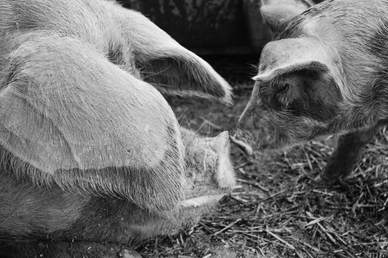 Dave: Where do you see the local food movement going? Like, in two to the three years, what do you think? Like, we have the Food Hub, we didn’t have the Food Hub two years ago… you know? And now we have it. Melinda: Yeah, I think the Food Hub, I mean, now that I’ve gotten more involved with that, and I tell people about it all the time, it’s amazing how many people don’t know about the Food Hub. I think that’s a great resource. Dave: Do you think more people would be buying, you know, pork at restaurants and other places? Melinda: I think some of that is cost. You know, because there’s a handful of restaurants here in town that are buying meat, but it’s a matter of producing that pork to where they can afford it. That’s the problem because that trickles right down to the consumer. So do you wanna spend six dollars for your hamburger or do you wanna spend ten or twelve to support the local farmer? Well, people have standards on what their time is worth, which I’ve learned that at the workshops. You always figure that out in your budget, but it’s a huge part of your budget. One thing I learned in one of the workshops, as well, is convenience. Somebody doesn’t wanna go and buy a pork roast and go home and cook it. Have you got this pork roast that’s already cooked, they’re all about it. They are going to take it home and have a BBQ party. But, we’ve got a generation of people coming up that’s not into cooking. They don’t want to cook. I mean I worked at a butcher shop and I watched people come in. If you say braise something. That’s just searing something in a pan, for god’s sake. They don’t even know what you mean. You know, or say crock pot? Throw it in a freaking crock pot? They’re 40 years old and they don’t even have a crock pot. Lord, that’s the easiest way to cook in the world. But… People don’t wanna cook anymore. [Laughter] People like convenience. It’s just, for some reason, they’ll come to town and go to the grocery store where they could go the other way and go the any fielder’s produce stand. You know, it’s pretty incredible. And one of my renters, they had little gardens like, fine, y’all can have little gardens, it’s no problem at all. But by the end of the summer though, she was like, "God that was so much work, you know, I don’t we’re gonna do that again next year, you know?" It’s like, yeah, it does take an effort. Dave: Yeah, it really does. 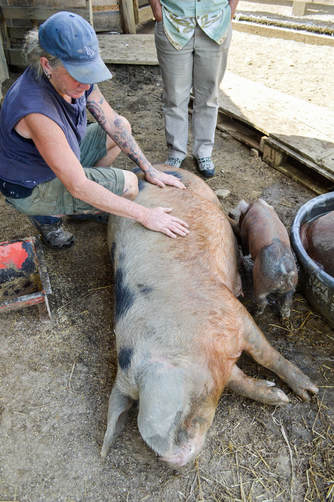 Melinda: I think people live beyond their budget and so people have to really be committed to their job. So you have to go work everyday and so… I had a guy one time, that was living in my tiny house and he was working for the one of the neighboring farms. So it was like, well you can stay my farm and when I leave, you can take care mine animals. Well, he moved in, and he was a great worker over at the neighbor’s farm. They had a bunches of pigs and I thought this is great, this is gonna work out really cool. Well, after a couple of weeks, it’s like what’s up man, you know? He goes “When I come home at 5 o’clock, I’m exhausted.” I was like, “You’d better pick a different career.” Because farming doesn’t end at 5. It just does not. You know, it might be full speed ahead at 11 o’clock, when the goat’s stuck in a tree. You know, you always have to listen, and they’re like babies in the field. You know, you always have to listen for your baby. It just doesn’t end. But I’d like to see if all the grocery stores close down and then watch what people do. I really encourage people to farm, that’s why I’d love for people to come see my house. During the Farm Tour, as much as a pain in the as at that is, there is always a few people that want to learn. But whether or not they really put forth and do it. Because you know when you start, having to get soil and do the seeds and weed and it’s a lot of hard work. Dave: Well… I’m glad that you do it. Melinda: Thanks Dave. [Laughter] On July 21th, 2017, Jessica Pierce and Amanda Carlton of Blue Ridge Women in Agriculture interviewed Female Producer Kelly Easterling from Ample Acre Farm in Lenoir, NC. 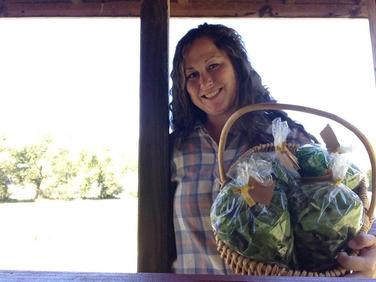 Kelly Esterling Kelly Esterling Jessica: What do you grow? Kelly: Vegetables, berries, and a little cut flowers. Jessica: How long have you been growing? Kelly: This is my second season. Jessica: How many acres do you grow on? Kelly: It’s about a half-acre of vegetables, berries, and bees collectively. Jessica: Where do you sell? Kelly: I sell at my produce stand and the Blowing Rock Farmers’ Market. Jessica: How many people do you employ? Kelly: It’s just me. [laughter] Amanda: What influenced you to get into farming? Kelly: I grew up with my mom always having a small vegetable garden. She is a huge plant lover, but she really loves flowers more than vegetables. When I started doing it on my own, I started to read and learn, and love farmers’ markets. And, I love to cook so the interest just sort of grew the more I learned about it. 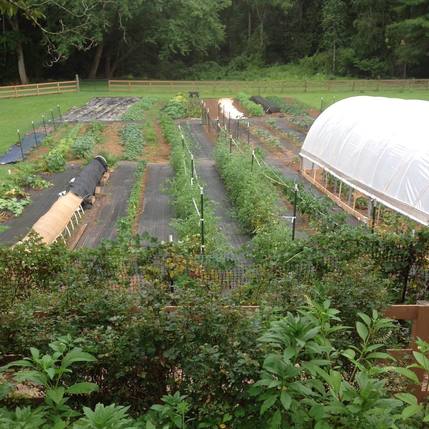 Ample Acre Farm Ample Acre Farm Jessica: Is gender a frequent topic of conversation in regards to farming, for you personally? Or do you hear it come up a lot? Kelly: You know, not too much. Not really a whole lot when you think about it. No one really says too much about it... I think most people sort of have a different idea of what a small farm is now, than maybe they would have thought 25 years ago. Amanda: Did you encounter barriers in becoming a farmer? And if so, were they gender related? Were these opportunities, or were they challenges? Kelly: Not really just because of the way we started out. Since we didn’t go out and look specifically for any type of farm land or special property. Because our farm is so small, it just sort of made it easy for it to happen. If I decide to expand and said I really want a five-acre farm instead of a half-acre farm, then it could be different just because we do have kids and a family and my husband works, you know, off the farm. So, I think it would be very different if we would have gone about it in a different way. But for me, it was pretty easy to get started. Jessica: What do you think is a stereotype of a farmer? Kelly: I would say probably to most people it would be an older gentleman with a tractor and, you know... [laughter] ...Overalls and a big field of something. But, at the same time I think so many people are involved with local produce now, and they are going to the farmers’ market and consumers are seeing younger people and different types of people standing behind the booth. 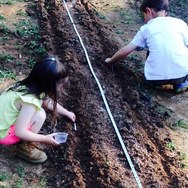 Kelly's children helping her plant beans, Sam (Left) & Chase (Right). Kelly's children helping her plant beans, Sam (Left) & Chase (Right). Amanda: Why do you think women are the fastest growing demographic of small farmers? Have you seen the demographics change? And if so, in what ways? Kelly: I would say that maybe my situation is unique, but I don’t really know. For me, I started out working as a chemist. I worked for a company, but I decided to stay at home with my son. So, at that time, which was like eight years ago, I really had no idea that I would ever be doing this. Now, I think that it makes sense maybe for it to be part of your family life. It allows me to be home and for the kids to be here with me. I know a lot of people who are farming who don’t even have kids or that’s not important to them. But, I think it makes sense for more people, even if they’re doing it on a small scale. Like maybe, they just have a quarter acre garden. And, they sell their extra produce as a way for them to supplement other income that they have from another job or a spouse or anything really. Farming allows you to be at your place. Jessica: Within the movement of sustainable agriculture should gender play an important role and what should that role be, if so? Kelly: I think it’s good for men and women maybe to equally look at the opportunity. I don’t know really if it matters. I don’t know, I’m just doing it. You know? Jessica: Right. Kelly: Maybe for some people... Maybe young people that have a stereotype of it just being, you know, the man in charge of the farm... The whole like farmer’s wife thing, whatever. You know? Again, just in general, our society doesn’t look at things like they used to. But, yeah! I think it’s equally as important for men and women to be interested. 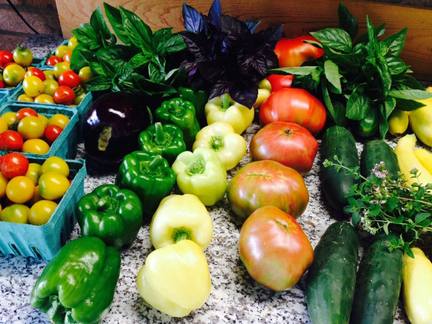 Ample Acre Farm's Produce Ample Acre Farm's Produce Amanda: Who has supported you and helped you through your experience? And, do you have a mentor and who was that? In what ways have they helped you? Kelly: I wouldn’t really say that I have a true mentor. Our extension agent here in Caldwell has helped me a lot in the last year. And, she’s got a good background in sustainable agriculture so, she answers questions. We communicate a lot through email, I can email her and ask questions like, “What is going on with this plant?” But, really in a lot of ways I feel like I’m self-taught. I haven’t worked on a farm. A lot of people start out maybe apprenticing or taking a job working for another small farmer and then they learn and go off and do their own thing. But for me, it was more like... I read a lot of books, I look online, you know? Amanda: And, your chemist background probably helped too, right? A little? Kelly: Yeah, maybe. [laughter] Yeah, I mean trial and error. Maybe there are mistakes I wouldn’t make if I did work for someone else. You know what I mean? But, it just wasn’t really practical for me to go and work on another farm. So, I guess I would kind of have to say that I don’t really have a mentor. Jessica: Would you be open to mentoring other people? Like, would that be something you would be interested in? Kelly: Yeah! Jessica: Like, more local farmers? Kelly: I mean I’m totally open to people coming here and maybe learning from me. But, I feel like I’m so new at it that I’m not like in the position to be one. But, it’s amazing how quickly you learn, which has a lot to do with there not being a huge amount of vegetable farms in our area. And, the ones that are, are more doing like two or three different crops and not doing, you know, thirty. You know what I’m saying? 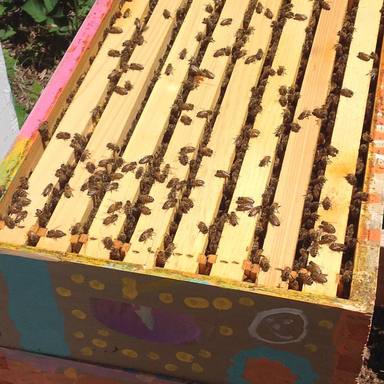 Ample Acre Farm's Bee Yard Ample Acre Farm's Bee Yard Jessica: So, there aren’t a lot of small sustainable farms in your area? Kelly: Yeah, and I think there are other parts of the state, other parts of the country, that have even more. But at the same time, I have friends and acquaintance that will stop by and ask, ‘Can come over here and just do stuff with you, because I’m are interested in gardening and learning?’ It’s just funny how you can kind of move up from being new and learning to teaching someone. And to answer your question, yeah, I’m totally open to mentoring someone. Because I think that in the long run, that’s really what we need. Yes, you can go to school and there are programs now that can teach people how to be small farmers. But, at the same time, there is a lot to learn. When we got into beekeeping it became that way. You really need someone to mentor you. You need the hands-on experience and someone coming over. Even if they don’t tell you what to do, and they are just giving you advice on how to make the decisions. Amanda: And a lot could go wrong with beekeeping, can’t it? Kelly: [laughter] Yes! Bees are complicated. Vegetables are complicated, but I think bees are more complicated. And, it’s a big investment to get into beekeeping so it’s not always just that side of it. We aren’t just interested in being beekeepers just because. We actually want to help pollinators, you know? We enjoy it, so the honey is like a fringe benefit. But, we’re not in it just to make honey. But yeah, I’d be happy to help people as much as I can. And, I think you learn through that too. On June 27th, 2017, Jessica Pierce and Amanda Carlton of Blue Ridge Women in Agriculture interviewed Kara Dodson of Full Moon Farm at the King Street Market. Kara is in her first year farming with her partner Jacob Crigler. Their farm is called Full Moon Farm, and they grow vegetables with the help of horses in Triplett, North Carolina. Full Moon Farm received a Direct-to-Farmer grant from Blue Ridge Women in Agriculture in 2016-2017 to drill a well. 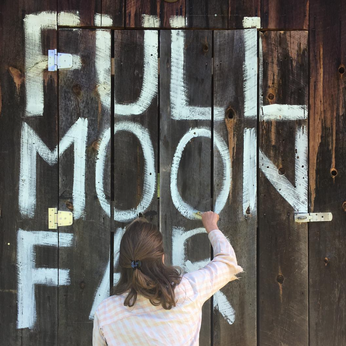 Kara Dodson Kara Dodson Jessica: What do you grow? Kara: We grow a large variety of vegetables and fruits. Anything from kale, collards, and broccoli to melons, squash, and tomatoes. Lots of lettuce, lots of radishes, and turnips. It’s just a whole mix... a market garden is what they call it. Jessica: How long have you been growing? Kara: At our current location, this is our first season, so not even a full year of growing food there. Two years ago, I did a year-long internship, or an apprenticeship at a farm. So, I was growing there but it wasn’t my own system. Jessica: Oh, nice. How many acres do you grow on right now? Kara: Less than one acre. Three quarters of an acre. Jessica: Other than the King Street Market, where else do you sell your produce? Kara: We have a community market down in Triplett where we live. That’s every other Saturday. It’s something that we set up with our neighbors. And then, we have a CSA program. We have members of that and we sell to restaurants. Jessica: Okay, very cool. How many people do you employ? Kara: Um, no one! [laughter] Not even myself, it’s not like I get paid hourly or anything. [more laughter] Amanda: What influenced you to get into farming? Kara: Oh, everyone has lots of influences! I think, if I narrowed it down I always return to my childhood around horses. And, we use horses on our farm to plow and to log, and make hills for the plants. So, I was really driven by the fact that I could continue a relationship with horses and make an income... and work outside... and do this with my partner... and make a stronger community through farming. So, like some very all-encompassing ideas that I think that a lot of people farm for, you know, healthy living. You get to contribute to the people around you. I also love hard labor, as much as it is physically wearing, it's very invigorating too. Amanda: And out of curiosity, is it more cost efficient to work with horses than a tractor? Kara: It can be debated. I think it is. Everybody farms on a different income scale or like expenditure scale. The number one argument for horses is that they procreate. So, you can create more horse but you can’t create more tractors from breeding. Also, horses produce manure for compost, which is something we use on our farm. It is really beneficial for organic gardening. They’re my friends. They’re like my kids. So, even if I wasn’t using them they would be a part of my life. But horses are really affordable, you just have to know how to take care of them. Because if you own a horse and you work a horse, but you don’t know what you are doing, you’ll get in trouble financially or you’ll get hurt. Jessica: So, what would you say makes your farm unique? Kara: For us, I think we typically think the horses make us unique because not many people are doing horse farming on a market scale. But, I also think that we take an approach to farming that is very pagan. We’re trying to rediscover much older ways to work with the land and agriculture, like pre-European. It’s a very slow process. It’s not like something we can mark on an asset sheet and be like I do all these practices and it gives us this much money, but it is something that drives us to want to continue to search that ancestry. And the horses are part of that because people worked with horses for centuries before they had machinery. 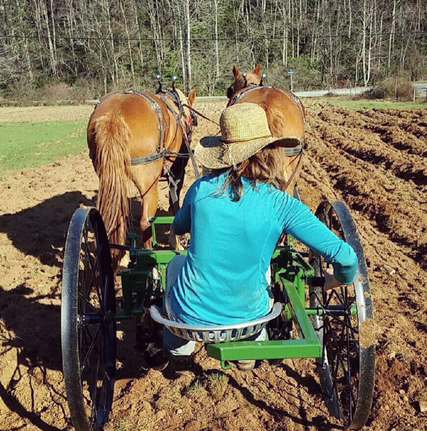 Kara Dodson Kara Dodson Amanda: How have you seen farming change in our area? Kara: I’m so new to it that it’s hard to answer that question. I think maybe people perceive us as hippies, or like very young kids doing something new. So, I think we are changing how other people view farming. Especially where we live, where we are amongst a much older population, people who are from here, and we are from Virginia, so we have a different accent, a different value system, maybe. Um… so I can’t say how I have seen farming change, but I can maybe speak to how people see us as different than what they know farming as. Amanda: Do you think about climate change? Kara: Oh yeah! [laughter] I mean the day Trump was elected president I wept for hours because I knew climate change was going to be much harder if impossible now to roll back. And that electing someone that could be so... evil... in terms of the environment was going to directly affect me as a farmer because there is now not going to be any top down regulation of the most problematic system. Which is our weather system, it changes everything. The rains that we have had this spring have created huge repercussions with all the diseases that we get, and the flooding that happens. It just changes things. And then last year we had that drought, and we had all these fires around us. I mean scary, you think your whole property could go up in flames. So yeah, climate change is definitely on our minds. Amanda: Is growing food for your local community something radical or a form of activism? Kara: [laughter] See, I was an activist for many years. I did community organizing for Appalachian Voices and I was like okay now my activism is farming. And in so many ways, you can say yes to that question and in more ways, in my life right now, I would say no. Because it is such a solitary act. When I can invite people in to be a part of farming, I can see it being helpful in either revolutionizing their concept of work or food for purpose. But beyond that, I mean... for me personally it’s not too much of activism right now, but it can be for a lot of people. 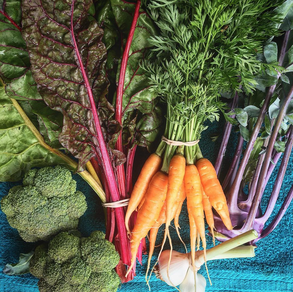 Full Moon Farm's Produce Full Moon Farm's Produce Amanda: Is the local food movement growing? And if so, how has it changed? Kara: I’ve been in Boone six years, off and on, and I think the more I’ve gotten into agriculture the more I realize how many restaurants are into local food. Even if they don’t put your name on a board or put a farm’s name on a board, they are still buying local produce. So, I think that is a really cool thing to watch. There is a lot of conversation about markets hitting a plateau. They became popular in the 90’s and 2000’s, and now they are hitting their mark of like capacity in terms of whether people show up, or what’s available, or the prices. So looking outside of those venues is really important. Jessica: Can you talk about what you think is a common stereotype of a farmer? And, I know you mentioned before that it is kind of changing but... Kara: Yeah! Um, a common stereotype... I think that they own a lot of land... maybe that they’re conservative... they’re male... they’re white... they are humble... they are Christian... those are stereotypes that I think are continually breaking down, but unfortunately not at a fast-enough rate. Older too! Which is a fact, it’s not even a stereotype. The average age of a farmer is 60 or 65. So yeah, it’s scary that much of our farming population is going to be dying or retiring. Farmer’s don’t retire though, they just die. Jessica: Have you seen these stereotypes become barriers for you as a farmer? Kara: Hmm, not yet. I guess I do realize that my husband will have conversations with people because we know it’s more socially acceptable than if I were to talk to a neighbor for help or someone at the government agency or someone who is delivering us something. So, being in a heterosexual relationship affords us that. I am also white so I am afforded a lot of privilege that way. And, people trust me automatically. It’s something that I just carry. So... I haven’t had too much difficulty yet. I have recieved grants, and we have applied for a USDA microloan. I applied for the loan as a woman and that seemed to help us for some small things. Jessica: Well that kind of leads us into our next question, which is have you encountered opportunities? Kara: Yeah, that would definitely be the case with the Blue Ridge Women in Agriculture grant that we received and the one microloan that we received. Jessica: What have been some of your biggest challenges to being a female farmer? Kara: I think there is a lot of self-doubt that’s seeded when women are children. That has been something that I had to overcome. Like, you know... you’re not strong enough or you don’t know what you’re doing or you’re not attractive… like very little things that are seeded and now that I am at an age where I am trying to run a business... and be responsible for animals and the crops… and deal with just the regular stresses of farming, like keeping at bay those things that we’re taught... yeah... the brainwashing. Jessica: Have you ever felt like quitting? Kara: No! No... 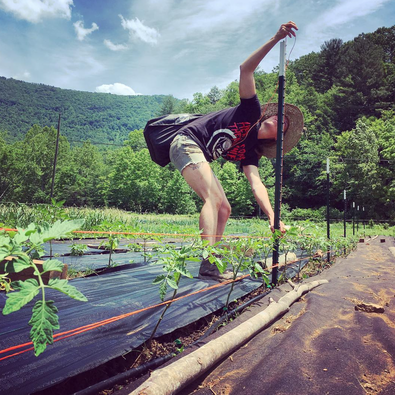 Kara Dodson Kara Dodson Amanda: Who has supported you and helped you through your experience? Kara: Oh gosh! [laughter] My parents have helped us a lot. Financially and emotionally, my parents have been very helpful. Jacob’s parents come up every other month and help out on a weekend. They don’t have a lot of time or money, but they are there to do stuff with us because they want to and they know it’s important. And, we have a lot of friends that just come out and help for free. So, maybe one day we would be able to hire people and that would be nice but, we get a lot of free help. Amanda: Did you have a mentor, who was that, and in what ways did they help you? Kara: My aunt was the first person who taught me how to work with horses. She taught me how to drive horses when I was like, 8... 10... 12 years old, that was a period of my life that I learned a lot. She taught me a lot about working with animals and harnessing power that animals provide. Also, that women can do things that men can do. And then, the person that actually taught me how to farm with horses lives around here. His name is Ian Snider. He taught me the more hands-on skills of how crops grow using horse power because it’s a very specific system. As with any tool you use, it kind of defines how you farm. So, yeah Ian was really helpful for that and his wife Kelly, too. She had a two-year-old at the time that I was apprenticing at their farm, so seeing how a mother has her kid with her when they are farming. Or how that just drives your incentives to be out in the field. Amanda: Motivating? Kara: Yeah! Definitely. It was really cool. Amanda: How has Blue Ridge Women in Agriculture supported or affected your work? Kara: I mean, just knowing that Blue Ridge Women in Agriculture is there is helpful. Knowing that I can go ask for any kind of advice or the fact that the staff knows so many people, like they might not have the answer but they know who might. So, I like that a lot. Jessica: Blue Ridge Women in Agriculture was started as a space for female farmers to learn how to grow food and develop agricultural enterprises. Which was 20 years ago, how have they affected our local food system and supported female growers? Kara: Oh gosh! [laughter] I think not enough people know about Blue Ridge Women in Ag, you know? The people that do know about Blue Ridge Women in Ag can list off the events that they have held and the workshops. Or, how their kids have learned from maybe something they have done, like the Seed Saving Library. That’s just amazing! And then the fact that they also tie in: ‘we’ll help farmers get money and we’ll help you get that equipment that you need.’ They are also really good at tying into other non-profits and sharing that marketing of what they do. So yeah, they have really left a huge impact. Those who know the Stetter family, know what a gift they are to our community. Jessica Stetter is a hardworking, clear-sighted, farming mother. To be with her is to be in the presence of a Buddhist teacher. She is an advocate for health, children, and awareness of our connection with the natural world. She is like a mother bear, but without the aggression, only the clear focus of nurturing and providing. Last month, we talked about the deliberation and joy of crafting a homestead and life for her family in Watauga County.
As a child in the Catskill Mountains, Jessica can call back memories of shoveling hay, playing in the hayloft and collecting eggs at a neighbors for fun. “I don’t remember feeling moved by the growing vegetables part early on, but the animal part - very early on I felt moved by that.” She described a time as a young adult taking a walk and stepping inside of a barn. As she pulled the barn doors shut, a distinct feeling of shutting many barn doors before flooded her consciousness. “It felt so deep and intrinsic”, she said. After that, where ever she and her husband lived they always sought a garden spot. Jessica and her husband David Stetter put in their first garden 8 years ago using the square-foot gardening method. “Once we got started, we were just rolling”, she told me. By the fall of that year, they were breaking more ground. The next spring, they added on again. The Stetter family now homesteads in Triplett, NC, growing as many vegetables as they can produce on the previously raw land of their home, as well as raising animals year round for dairy and meat. “Our focus”, Jessica says, “is on how we can be as self-sustainable as possible … to set ourselves up so that we can feed ourselves, and one day plus”. It would be challenging to grow enough grain for a standard american, high carbohydrate diet, or even just for animal feed. Instead, Jessica feeds her family a high-protein, low-carb diet making it possible to produce the majority of her family’s food. Goats and poultry get pasture, while pigs get scrap produce and whey to supplement the necessary off-farm grain. In planning what crops or animals to raise, she asks herself “What do we need to eat for the year and how can we grow that? Can we get carbs from winter squash and potatoes, and then store enough for the year? Can we grow fruit?”. Last year, they added a greenhouse and have enjoyed a steady supply of fresh greens ever since. When we talked in late February, they were still eating on last year’s winter squash. Additions for this spring include planting dwarf fruit trees. Jessica and her family work in small increments with steady patience. They understand the depth of time needed to transform rough land into a supportive homestead. In the fall, they moved fencing, turning goats onto new land. After housing turkeys for a time, the old goat pasture will become additional garden. They will watch what happens to the new goat paddock and then decide if they want to grow grass there for pasture or open up even more garden space, migrating the goats on again. As their family grows, and as they learn from experience, their systems of homesteading become more refined. Each year, things move with greater efficiency. The Stetters harvest their own animals for meat aiming for a “mutually beneficial arrangement”. This means giving the animals the best lives possible, and in time, taking their lives with veneration and gratitude. Jessica tells her goats to “have a good day” each morning after feeding, and always thanks them for their milk. She describes parallels between death and birth, honoring the value of every living thing and the magical transition that brings us to and from the world. “When I witness a birth, it is profound every single time…. You go from something not being there to all of sudden there it is, and you watched it come out. There is a palpable energy that’s just tremendous and I feel the same energy when you take a life.” Jessica recounted a time when her grandmother asked her daughter, Montana, if it was hard to eat an animal they had raised and butchered themselves. Montana replied, “It’s like eating love-meat, Grandma”. Jessica homeschools her two children. At ages 9 and 11, they are a part of providing their own food whether that means helping to pluck chickens, clean barns or deciding what their own goals for the homestead are. Daily chores happen first thing in the morning and again in the evening, but during the day they try to incorporate a job on the land into their homeschool experience. The Stetter kids have an extensive understanding of biology for their age, exploring muscles and organs of the body through their butchery. They also understand the ratio of effort exerted in exchange for physical returns. Jessica says she finds joy in the homesteading and home-school collaboration. They have a very real opportunity to experience the full circle of life. The whole family is engaged in reclaiming and passing down skills that, while not the modern norm, were once innate to humans. Listening to her talk, one can’t help but get the feeling of spaciousness. Instead of running to and from town, she is fostering space in her mind as she connects and transforms the space of her home. There are challenges, too, as all parents and people trying to follow their heart know: the challenge of balancing the needs of each person in the family, and the juggle of one person working off farm and one person on the farm with kids. But overall, they have a beautiful set up. “I interface and live as much as I can in harmony with the natural world”, Jessica told me. And, by proxy or choice, her kids do, too. When we talked about community, Jessica first recounted the supportive joy of living in a county with many others who are also striving to live in varying degrees of harmony with the land. “I feel very blessed to know that if we needed help, we live in a place where that (support) is important to a lot of people,” she said. Regarding their immediate location, their homestead neighbors other homesteads, and they are all able to feel camaraderie in living close to the land. “There are good people here”, she said. However, there are contradictions to the feelings of community when looking at the wider community: the county, state and even country we live in. We talked about the incongruity of living in a physically beautiful place where many people act with intention, while simultaneously living in a county that is okay with an uncovered asphalt plant within a few mile radius from multiple schools. “Not to get political,” she said, “But that’s also my community…. Parkway school is where my children would go to school if they were in school.” We talked about the dissonance in our culture between human beings and their natural, immediate surroundings. “If everyone was shining their light on their corner of the world, it would get it all covered”, she laughed, “So I really try to work on our corner, and I do think we are very lucky to have so many wonderful people around us.” Some of the most valuable advice Jessica received in her homestead journey she now passes on: if you have the time, watch the land. “Be observant, be aware,” she says. “That’s how you see the things that are problems. That’s how you see the things that are good. That’s how you see the things that aren’t problems yet ,but probably will become problems.” Take a year to see what happens here and there on the land before willfully shaping it. She takes this farther to observing ergonomics throughout the daily chores on the farm, always seeking to move in a sustainable way for the body. This patient and spacious beginning has clearly permeated the way the Stetters continue to homestead. To hear Jessica talk about it, homesteading does sound doable. She acts on the urgency to grow food, without a stressful rush. Deliberate actions are taken diligently with a spacious mindset for patience. She holds the grand vision, and roots it into the reality of hard work. We could all gain to learn from this wisdom. By: Elisabeth McCachren 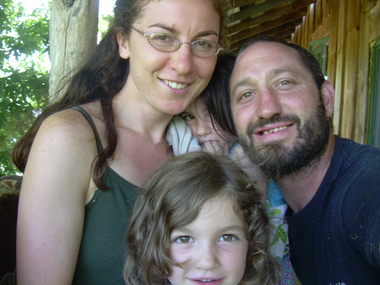 What started as a gift subscription to Mother Earth News, spawned a lifestyle of homesteading for Rebecca Tobiassen. Along with her husband, Ross, and their two small daughters, Rebecca has created a home and life rooted in self-sufficiency and health. Whether planting fruit trees, making soap, turning compost, or cooking on her wood stove, she is conscious, useful and kind with the land and mindful of it’s connection to both their health, and the health of the world. “I guess I’ve always thought of it as my way of changing the world”, says Rebecca about their organic homesteading life. Rebecca’s homestead stands out to garden enthusiasts and aspiring farmers because nearly every bit of usable land is turned into garden or pasture. Her house itself even has a past life as a chicken coop, converted to a home in the sixties. Rebecca started out with a small garden plot outside the silo in 2006, and from there added on each year. The land has transformed from a wood lot and small yard into raised beds, a hoop house, a beginning orchard, and fields. “Anything that we would eat fresh, that’s what I try to grow”, says Rebecca. Sugar snaps, beans for fresh eating or drying, corn for hominy, and lots of watermelon make the top of the list. They also began an orchard, starting with apple trees three years ago and have added plums, cherries, and even a peach tree since. Alongside vegetables Rebecca and her family raise livestock including a pig, Saanen goats, Muscovy ducks, and laying hens. “The main reason I got into pigs was for the lard. That’s the main oil I cook with. The goats are more for milk, cheese and yogurt.” Her consciousness spreads into the choice of animals to raise, mindful of the grain it takes to supplement livestock, how much meat their family actually needs to eat, and the inhumanities of large hatcheries. They have raised meat chickens in the past, but Rebecca says she doesn’t think they will again because of how the hatcheries breed and raise the birds. “I just don’t like buying them … the baby chicks come from the same place that every other big operation gets their chicks from.” They hatch eggs from their ducks and hens in order to keep new birds in the rotation. As for grain supplementation, she weighs the outputs and inputs. Goats need grain to produce milk, but their output of dairy is large. Pigs can eat scraps and even some cover crops from the winter garden. In summer, the animals all get plenty of browse. 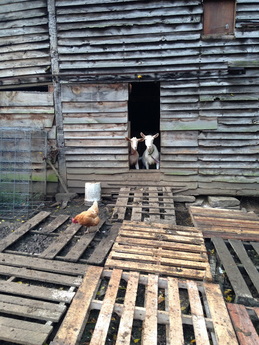 She’s inspiringly innovative in her preservation methods. For example, she makes syrup from watermelon that is similar to sorghum molasses to store it for winter. This year she hopes to press her own sunflower oil from an oil press. Her husband made a root cellar a few years back and after fresh eating, the Summer harvest gets divided three ways: root cellar, canned, and frozen. Rebecca mothers and homeschools her two daughters, and any mama knows how much attention small children require and take away from other tasks. Rebecca says she’s learned a lot of patience, from both parenting and farming, and especially doing the two together. She has learned to let some things go if they aren’t going to be perfect or taken care of, including letting go a desire to sell produce. “I guess that’s one of the reasons I started thinking of the farm as growing just for ourselves...I realized our lives were going to be a lot better if I wasn’t focused on selling,” she stated. Doing it for the sake of doing it preserves some of the innate joy in her daily chores. Relinquishing the pressure to sell and make a profit has removed a lot of potential challenges of farming with children, because if weeding does not happen, or something does not get picked or planted on time, it’s truly okay. Time management is tricky with young children. Rebecca laughed that she and her husband used to call themselves “twilight farmers” because the only time they could work in the garden or with the animals was before sunrise or after sunset. She sees the joy in homesteading with small children, too. “I love it when we are all outside, and the girls are just hanging out eating sugar snaps … Addie gets into harvesting, she’s got her overalls on, she’s gotta dress the part, and that’s just the best when they do get into it,” Rebecca says. “But,” she adds laughing, “a lot of times they don’t ”. One of the greatest joys she mentions is feeling good about what they eat and the mindfulness of how it was raised. And simply the satisfaction of walking into the grocery store when they do need outside food, and zooming past the produce and meat departments. 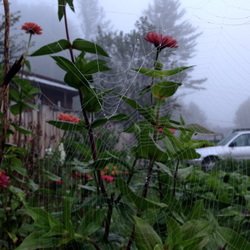 Learning more about the plants and land each year, Rebecca has established some interesting methods of gardening. She saves seeds that have thrived well on their land, and consistently builds their soil health through cover crops, rotating plants, and compost. She starts seedlings in her cold frame, which allows her to get a head start with strong, healthy plants in the spring. Her tomatoes are grown in a hoop house, protecting them from the common blights of our area, and she practices companion planting in the raised beds and field. She also harvests a lot of wild plants from the land including nettles and bee balm. Rebecca takes homesteading beyond food and into other daily needs. In cool months, she cooks their meals on a wood cookstove, and they heat their home with wood as well. She makes soap for washing bodies and laundry with deer fat and lye that she makes with the ashes from the wood stove. Their property has housed an organic composting operation for the last few years. They also use a composting toilet. When asked what advice she would give someone that wants to begin homesteading Rebecca said simply, “Just do it. Just start it.” Then she laughed and added, “I’ve made so many mistakes! But that doesn’t mean I’m not going to try again.” She shared how much is learned just from the trial and error of trying something you are interested in, and how every year things fall into place a bit more than before because of the things you learn from mistakes. Kind and open, Rebecca is easy to approach with questions about raising goats, vegetables or fruits to the aspiring homesteader. When listening to her speak about homesteading it is apparent that this is a lifelong journey of learning, as well as providing. When one starts to unravel the thread of growing food, they also unravel threads of big agriculture, health of people and of soil, and true sustainability. At the end of their driveway, and right across from the Wren’s Nest, Rebecca does put out a small produce stand in the summertime, stocked with whatever is coming out of the garden - lettuce, beans, cucumbers, eggs, and greens. People stop by on their way home, and sometimes, the girls run down to talk with the customers. Rebecca told me of a time she walked up while her 6 year old, Addie, was instructing a woman at the produce stand in cooking spinach. “Take a little butter and melt it in the pan, then add a little garlic and make a BEAUTIFUL cream sauce”. “I don’t even make that!” Rebecca laughed, but to the onlooker it shows the excitement of good, real food that her children have internalized from their daily life of chores, harvesting, and dirt. By: Christina Bailey, Amy Fielder, and Sadikshya Aryal B&W photo below taken by: Sarene Cullen 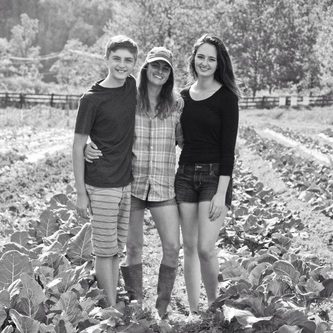 Amy Fiedler is the epitome of a strong and motivated woman. One of her many strengths is her ability to create and utilize community. Her friendly personality and outgoing spirit attract others to join her in her admirable life endeavor of being a force in the organic and local food movements. She has given many interns, volunteers, and school groups the opportunity to get their hands dirty with experience and to become inspired by the successful farming operation she has created. Taking a peek into Amy's past helped to explain why she is such a beautiful blend of charm and authenticity. Amy grew up outside of Manhattan, the most populated borough of New York City. Despite being a young city girl, she was exposed at a young age to the beauty and thrill of being completely submerged in nature. Her family would take her and her siblings on backpacking adventures around the country for weeks at a time, trekking through some of the most breathtaking places in our country including Yellowstone and the Grand Tetons. In addition to these eye opening escapades, Amy and her siblings used to spend weeks at a time over the summers living with their grandparents in Southern Indiana on a 100+ acre cattle farm. Amy remembers how amazing it felt being on their farm. Thinking back on those times now, she appreciates how hard her grandparents actually worked to make that dream a reality. In 2008, after receiving a degree in Secondary Education/English from Appalachian State University and working as a massage therapist, Amy decided to explore what would become her life's passion; farming. As a single mom with two kids, Amy began her farming venture in Vilas, North Carolina with her mother, who she credits for the detail organization, bookwork, planning, seedling production and CSA deliveries, in addition to arriving on the farm every morning to work alongside her in the fields. Amy manages the farm and does the hands on work with the help of interns and volunteers in the community. "Farming is a lifestyle, and it can be a sustainable one,” says Amy. The last 7 years of her life have proven that to be the case. 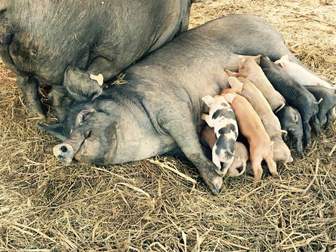 Springhouse Farm is a certified organic vegetable, pasture raised meat, and honey farm. "Good, organic, local, clean food is highly valued in this area,” says Amy. “Our food is the first medicine we put into our bodies besides the water we drink and the air we breathe." Luckily for farms like Springhouse, this is an idea that people are waking up to. If food is our medicine, then that makes farmers our doctors. It is clear when Amy speaks of her connection to the earth and to people that she is a healer. "Farmers become so hyper sensitive, not only to the land, animals and weather, but also to the people.” She attributes her success to the support given by her extension agency, the camaraderie with other farmers, and the network of local organizations and community members supporting small family farms in the area. Amy is not only an incredibly hard working farmer, she is also a teacher and a mentor. She loves showing other curious souls the ways of farming. "I'm a people person, I love to work with people and show them the farm. I'm good at something and I've had experience doing it, so I love sharing that!... It's like society has lost touch with something that the farm brings back. I'm intrigued with this idea of how it is healing to work in the dirt and with the pigs." People who have spent time on Amy's farm speak of her inspiration and of being touched by their experiences at Springhouse Farm. "As an intern, Amy welcomed me with open arms. She's the kind of person who becomes your best-friend within the first five minutes of meeting each other. Amy is as down to earth, genuine and astoundingly beautiful as the Appalachian farming lifestyle that she lives out and shares with others. I am so grateful for the knowledge and sisterhood that Amy has shared with me,” says intern and friend Michelle Dineen. Although many aspects of farming are romantic and inspirational, farming is not in the least bit a prissy career. Amy states that "When people make it through a whole season on the farm, I'm always amazed if they decide 'Oh yeah, this is what I want to do!' It's not like we just watch the carrots grow... it’s monotonous, backbreaking, and heartbreaking at times and you get out of it what you put into it! It's hard work day after day. It's a continual learning experience. But I hope that people take some nugget of the experience and grow it to do something that I could never dream of." Amy sells her produce and pastured pork at the Watauga County Farmers market, to New Appalachia and local restaurants, through the High Country CSA, her on-farm produce stand and CSA. To learn more about Amy and Springhouse Farm at www.springhousefarm.net 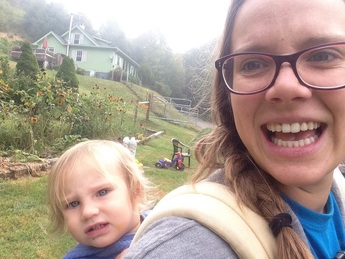 By: Christina Bailey and Mary Pope If you’ve ever met Lis McCachren, chances are you've experienced for yourself just how genuine her presence is. Always prepared with a ready smile, Lis’ heartfelt authenticity spills over into everything she does. This is especially apparent in the beautiful homestead she has created with her family. In just a few years, on just a few acres, Lis and her partner Philip have built themselves a thriving homestead on their property in Sugar Grove, NC. Their homestead is a diverse operation. In addition to their two sweet youngsters Malcolm (4) and Eve (1), Lis and Philip raise 7 goats, 11 ducks, and seasonal hogs, as well as a veggie garden, fruit trees, and berry bushes. “The goal is self-sufficiency, and knowing the skills of how to do it,” says Lis. “The survivalist in me really feels like we need to know how to grow our own food in this day and age. It’s something I want to pass on to my kids.” She adds that being in such close contact to the food she’s putting into her and her family’s bodies makes her feel “like a whole human being.” Like many here in the High Country, Lis first moved to Boone, NC in order to attend Appalachian State University. The university as well the community around her led Lis to a period in her life in which she says she “become more aware.” Much of this awareness focused on the food she was using to fuel her body and where it was actually coming from. As she began to question and learn more about modern industrial food systems, she adopted a vegetarian diet for some time. Also during these first years in Boone, Lis began studying the ancient path of yoga, and spent time traveling through India with Philip. Although all of these experiences led her towards becoming a more connected and conscious individual, there’s one experience she credits as more influential than the rest: becoming a mother. Lis attributes her inspiration for the lifestyle she’s living today most fully to the birth of her son Malcolm. "Almost immediately after he was born, I was like ‘we have to be raising our food!’ That was the seed, when I became a mom.” She wanted her family to be connected to their food, and to have the best nutrition possible, and as she wisely posits: “The best is what I raise myself.” In addition to her son, Lis honors her friend and mentor Holly Whitesides of Against The Grain Farm as an inspiration. She says admiringly that she likes "to look at Holly’s hands and think about all of the things that her hands do in one day.” She muses on how interesting it is that so many women are farming and homesteading in the High Country community. “These women are who I look up to. I connect with them and they have a powerful presence in our community.” 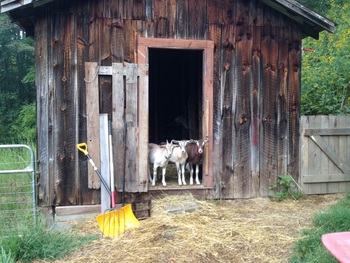 These days Lis is working part time as a doula and a yoga teacher within the local community, as well as enjoying the day to day work of raising her children and running a homestead. She says “growing my own food is part of being at home with my kids. It’s woven into the fabric of being a parent for me right now.” She spends her days milking goats, cleaning animal stalls, canning food, cooking, gardening, teaching her children and being a role model and a source of wisdom to those around her. “The best part is on a Sunday, when I can step back and not see the weeds and the worry and all of the things that are not working out…but be at home and see the land, eat three meals a day that all came from our home, and just be in that space of our homestead, and really feel like ‘this is so beautiful, I love my life!’ Those moments are when I can really see how good it is.” In addition to cultivating this life for her family, Lis sees the bigger picture of how this kind of lifestyle affects the larger world. She would like to see more community education on growing and harvesting your own food, and more effort put towards bridging the gap between the old-time established farmers and the new farmers just starting out in our region and beyond. “We all live here together, and we all have to work together, live in the same place. If people are hurting, or unhealthy, or ignorant even…it affects our whole culture.” Lis culminates her musings on this lifestyle by saying, “The purpose is to connect more with our food and enhance our health. Our bodies are our vessels for our whole experience of life. Knowing the skill set to be able to do that feels like a very natural part of being a human being now that I’ve opened that can of worms.” Her words to anyone considering the homesteading life: “Just do it. If it’s really in your heart, you should just go for it! Life is always going to be full and crazy, but if it’s something you really want to be part of your life, you just have to do it!" |
BRWIA PROFILE PROJECTEach month we do our best to profile a Woman in Agriculture in our region. These women are diverse - they have come from a variety of backgrounds and include farmers, homesteaders, and activists. They exemplify the multitude of ways women are working to connect with and change our food system. Female Farmer Profile ProjectThe BRWIA Profiles evolved out of the Female Farmer Profiles which can be found archived HERE.
Categories |
|
|
P.O. Box 67 | 969 W King Street
Boone, NC 28607 | 828.386.1537 Email: info@brwia.org |
